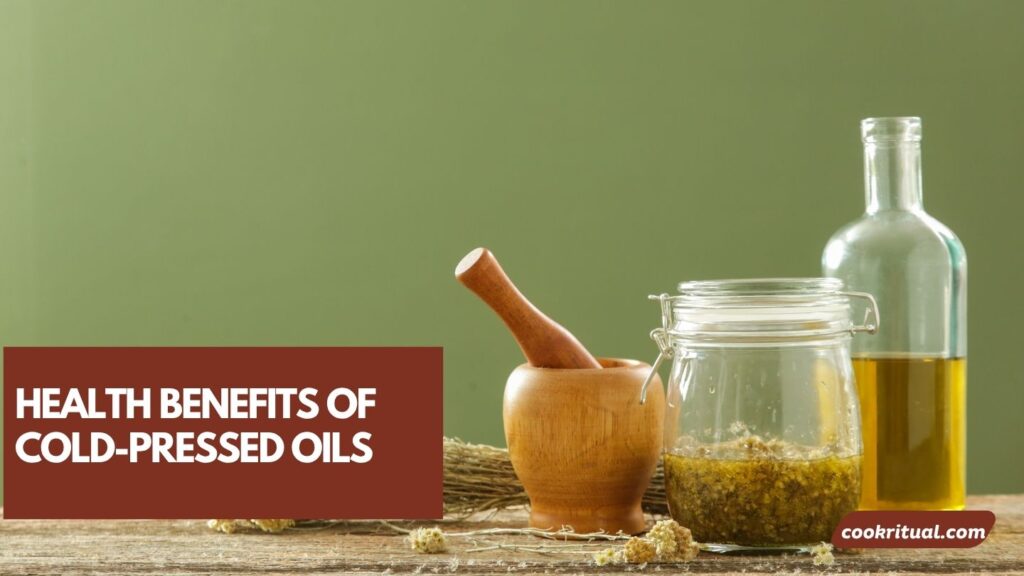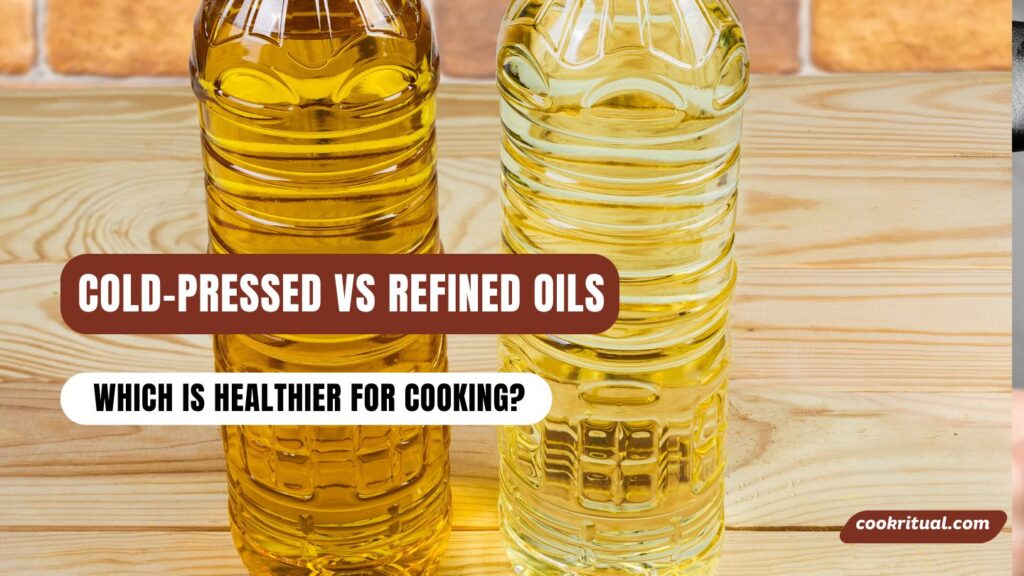Cold-pressed oils are generally healthier than refined oils because they retain more nutrients and undergo minimal processing. But as with many things in the kitchen, it’s not always a clear-cut choice.
When we’re standing in the cooking oil aisle, it’s easy to get overwhelmed by labels like “cold-pressed,” “refined,” “expeller-pressed,” or “organic.” Each one claims to be the better pick for our health and our cooking. The truth is, both cold-pressed and refined oils have a place in a well-balanced kitchen—it all depends on how we use them.
As health-conscious home cooks or busy professionals trying to make better food choices, understanding the difference between these oils can help us cook smarter, feel better, and even boost the flavor of our meals. In this guide, we’ll break down how each oil is made, how they perform in the kitchen, and which ones are best for heart health, frying, or salad dressings. Whether we’re meal prepping on Sunday or whipping up a quick stir-fry after work, knowing which oil to reach for can make a real difference.
Contents
- 1 What Are Cold-Pressed Oils?
- 2 What Are Refined Oils?
- 3 Nutritional Differences: Cold-Pressed vs Refined Oils
- 4 Cooking Performance and Smoke Point
- 5 Taste, Texture, and Culinary Use
- 6 Shelf Life and Storage
- 7 Health Benefits and Risks
- 8 Cold-Pressed vs Refined Oils: Pros and Cons Table
- 9 How to Choose the Right Oil for Your Needs
- 10 Expert Tips for Using Cooking Oils
- 11 Frequently Asked Questions (FAQs)
- 12 Recommended Cold-Pressed and Refined Oil Brands
- 13 Final Thoughts: Which Oil Should You Choose?
What Are Cold-Pressed Oils?
How They’re Made
Cold-pressed oils are made by gently pressing seeds, nuts, or fruits without using heat or chemicals. This process keeps most of the natural flavor, color, and nutrients. Since no high temperatures are used, the oil keeps more of its vitamins, antioxidants, and healthy fats.
For example, cold-pressed olive oil is rich in polyphenols, which are plant-based compounds that may help reduce inflammation and support heart health.
Common Types of Cold-Pressed Oils
- Extra virgin olive oil
- Sesame oil
- Avocado oil
- Flaxseed oil
- Coconut oil (unrefined)
These oils usually have a stronger taste and darker color. They’re best for low-heat cooking or no-heat uses like salad dressings and dips.
Why People Choose Cold-Pressed Oils
- They keep more of their natural nutrients.
- They don’t contain added chemicals or artificial flavors.
- Many are organic or made with fewer steps.
If we’re trying to eat clean and get more nutrients from our food, cold-pressed oils can be a smart option.
What Are Refined Oils?

How Refining Works
Refined oils go through extra steps after being pressed. They’re heated and filtered using chemicals like hexane to remove odor, color, and unwanted particles. This gives them a light taste and clear look.
While this makes the oil more stable for cooking, it also removes some of the nutrients and healthy plant compounds.
According to the Harvard T.H. Chan School of Public Health, refined oils may lose some of their health benefits due to heat and processing, especially compared to cold-pressed versions.
Common Types of Refined Oils
- Canola oil
- Soybean oil
- Corn oil
- Vegetable oil blends
- Refined sunflower or safflower oil
These are the oils we often see in restaurants or large cooking batches because they’re cheap, neutral in flavor, and good for high-heat frying.
Why People Use Refined Oils
- Higher smoke point makes them good for frying or baking.
- Mild taste works well in many recipes.
- Longer shelf life means they won’t go bad as quickly.
While refined oils may not be as nutrient-rich, they’re helpful when we need an oil that won’t burn or change the taste of a dish.
Nutritional Differences: Cold-Pressed vs Refined Oils
When it comes to nutrition, cold-pressed oils usually come out on top. They keep more omega-3 fatty acids, vitamin E, and antioxidants like polyphenols, which can support heart and brain health.
Refined oils, on the other hand, lose some of these nutrients during high-heat processing.
Here’s a quick comparison of the two:
Nutritional Comparison Table
| Feature | Cold-Pressed Oils | Refined Oils |
| Processing Method | Low-heat, mechanical pressing | High-heat, chemical solvents |
| Nutrient Retention | High (keeps most vitamins & antioxidants) | Low (many nutrients are lost) |
| Omega-3 Fatty Acids | Often higher (like in flaxseed oil) | Often lower or removed |
| Trans Fats | None or very low | May be present in small amounts |
| Taste & Aroma | Rich, natural flavor | Mild or neutral flavor |
| Best Use | Low-heat cooking, dressings | High-heat cooking, frying |
If we’re looking to improve our cardiovascular health, getting more omega-3s and antioxidants through cold-pressed oils is a good move. But refined oils can still be safe and practical when used the right way.
Cooking Performance and Smoke Point
Why Smoke Point Matters
The smoke point is the temperature at which oil starts to smoke and break down. When that happens, it not only changes the taste of the food but also creates harmful compounds like acrolein, which can irritate the lungs and eyes.
Cold-pressed oils usually have a lower smoke point because they’re unrefined. This means they’re better for low-heat cooking like sautéing or drizzling over food. Refined oils, on the other hand, can handle higher temperatures without breaking down.
Best Oils by Cooking Method
| Cooking Method | Best Oil Type | Why It Works |
| Salad dressings | Cold-pressed olive oil | Adds flavor and nutrients, no heat needed |
| Low-heat sautéing | Cold-pressed avocado oil | Stays stable at mild heat |
| Medium-heat cooking | Refined olive oil | Neutral flavor, mild processing |
| High-heat frying | Refined canola or sunflower oil | High smoke point, stable under heat |
| Baking | Refined vegetable oil | Light taste, handles oven temps easily |
Choosing the right oil for the job helps avoid burning food and keeps more good fats intact. For example, avocado oil is a rare cold-pressed oil that still has a higher smoke point.
Taste, Texture, and Culinary Use
Flavor and Feel in the Kitchen
Cold-pressed oils have bold, rich flavors because they’re less processed. You’ll notice a peppery kick in extra virgin olive oil or a nutty tone in sesame oil. These oils also tend to be thicker or cloudier, adding texture to dips or dressings.
Refined oils, by contrast, have almost no smell or flavor. That makes them perfect when we don’t want oil to compete with the food—like in baked goods or stir-fry sauces.
When to Use Each Type
- Cold-pressed oils: Perfect for finishing dishes, making dressings, or dipping fresh bread.
- Refined oils: Ideal for frying, deep-frying, or baking due to their neutral taste and high heat resistance.
Whether we’re looking to enhance flavor or keep things crisp and clean, the right oil can make a big difference in how our food turns out.
Shelf Life and Storage
How Long Do They Last?
Because cold-pressed oils aren’t treated with preservatives or stabilizers, they spoil faster. Most last 3–6 months once opened. Some, like flaxseed oil, need to be refrigerated to stay fresh. You can check for spoilage by smell—if it smells bitter or like paint, it’s time to toss it.
Refined oils last much longer—often 12 months or more—because of their stable makeup. Their flavor stays consistent, even if stored in a pantry.
Proper Storage Tips
- Keep oils in a cool, dark place (like a cupboard).
- Use dark glass bottles to block sunlight.
- Always close the cap tightly to reduce air exposure.
According to USDA food storage guidelines, temperature and light are the biggest factors in oil spoilage. Keeping oils away from heat and light helps preserve flavor and nutrients.
Health Benefits and Risks
Health Benefits of Cold-Pressed Oils

Cold-pressed oils are often praised for their high content of healthy fats like omega-3 and omega-6 fatty acids, as well as antioxidants such as vitamin E and polyphenols. These nutrients support heart health, reduce inflammation, and improve brain function. For example, extra virgin olive oil is linked to lower risk of heart disease, as confirmed by studies from Harvard Health Publishing.
Because cold-pressed oils undergo minimal processing, they don’t contain harmful chemicals or additives. This means they’re less likely to contribute to oxidative stress, which can damage cells.
Health Considerations for Refined Oils
Refined oils lose many of their natural nutrients due to the high heat and chemical treatments used during processing. Some refined oils may contain small amounts of trans fats, which are linked to increased risk of heart disease. However, many refined oils like canola and sunflower oil are still considered safe and provide energy from fats without harmful additives when used properly.
The American Heart Association recommends choosing oils with healthy unsaturated fats and limiting trans fat intake. Using refined oils occasionally for frying or baking is acceptable but not ideal as a daily source of fat.
Cold-Pressed vs Refined Oils: Pros and Cons Table
| Feature | Cold-Pressed Oils | Refined Oils |
| Nutrient Content | Rich in antioxidants, vitamins, and healthy fats | Lower nutrient content due to processing |
| Flavor | Strong, distinct, natural flavors | Mild, neutral flavor |
| Smoke Point | Lower smoke point, best for low-heat cooking | Higher smoke point, good for frying and baking |
| Shelf Life | Shorter shelf life (3–6 months) | Longer shelf life (up to 12 months or more) |
| Health Impact | Supports heart health and reduces inflammation | Safe if used moderately, but may contain trans fats |
| Price | Generally more expensive | Usually more affordable |
| Processing | Minimal, no chemicals | Uses heat and chemicals |
How to Choose the Right Oil for Your Needs
Choosing the best oil depends on what you plan to cook, your health goals, and taste preferences.
- For low-heat cooking, dressings, and dips, opt for cold-pressed oils like extra virgin olive oil or avocado oil. These add flavor and nutrients to your meals.
- For high-heat cooking or frying, choose refined oils with high smoke points like refined canola, sunflower, or safflower oil. They won’t burn easily and keep your food tasting fresh.
- If you want a budget-friendly oil for everyday cooking, refined oils can be a practical choice.
- Those focused on heart health should prioritize oils rich in unsaturated fats and antioxidants, which cold-pressed oils provide.
By understanding these factors, we can make better choices that suit our cooking style and support our well-being.
Expert Tips for Using Cooking Oils
Maximize Flavor and Nutrition
- Store oils properly to keep them fresh longer—away from heat and light. Use dark glass bottles if possible.
- Use cold-pressed oils for finishing dishes like salads, roasted veggies, or dips to preserve their nutrients and taste.
- Avoid overheating cold-pressed oils to prevent nutrient loss and unpleasant flavors.
- When frying or baking at high temperatures, stick to refined oils with higher smoke points to avoid harmful breakdown.
- Rotate different oils to benefit from a variety of healthy fats and flavors in your diet.
- Check expiration dates and smell oils regularly; rancid oil smells sour or bitter and should be discarded.
Following these tips helps us get the most out of both cold-pressed and refined oils, balancing health and cooking needs.
Frequently Asked Questions (FAQs)
Is cold-pressed oil always better than refined oil?
Cold-pressed oils usually retain more nutrients and flavor, but refined oils are better for high-heat cooking due to their stability.
Can I use cold-pressed oil for frying?
It’s not recommended because cold-pressed oils have lower smoke points and can break down, producing harmful compounds.
How do I know if my oil has gone bad?
Check for a sour or bitter smell and off taste. Rancid oil can affect the flavor and may be unhealthy.
Are refined oils safe to consume daily?
Yes, when consumed in moderation and as part of a balanced diet. Choose refined oils low in trans fats.
What’s the best oil for heart health?
Extra virgin olive oil, avocado oil, and flaxseed oil are great choices because of their healthy fats and antioxidants.
Recommended Cold-Pressed and Refined Oil Brands
Here are some trusted brands that produce high-quality oils:
| Type | Recommended Brands |
| Cold-Pressed | Bragg, La Tourangelle, Spectrum Naturals |
| Refined | Canola Harvest, 365 by Whole Foods, Mazola |
When choosing oils, look for organic certification, non-GMO labels, and cold-pressed or expeller-pressed descriptions on the bottle.
Final Thoughts: Which Oil Should You Choose?
Choosing between cold-pressed and refined oils depends on your cooking needs and health goals. Cold-pressed oils are nutrient-rich, flavorful, and perfect for dressings or low-heat cooking. They offer antioxidants and healthy fats that support overall wellness. Meanwhile, refined oils provide a neutral taste, longer shelf life, and higher smoke points, making them better suited for frying or baking.
For balanced health and great taste, it’s smart to keep both types in your kitchen. Use cold-pressed oils when you want flavor and nutrients, and refined oils when you need stability at high temperatures.
Remember, the best oil is one you enjoy and use wisely as part of a varied diet.

